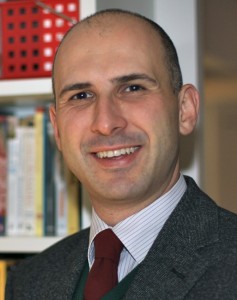 “The Serbian Orthodox Church’s decision to use a flood-inspired supplicatory prayer as an opportunity to undermine the LGBT community and the 2014 Belgrade Pride is scandalous and deserves serious criticism. Should the close relationship between Church and government fully consolidate, the status of the LGBT community will most likely remain ignored and threatened”, argues Branislav Radeljić.
“The Serbian Orthodox Church’s decision to use a flood-inspired supplicatory prayer as an opportunity to undermine the LGBT community and the 2014 Belgrade Pride is scandalous and deserves serious criticism. Should the close relationship between Church and government fully consolidate, the status of the LGBT community will most likely remain ignored and threatened”, argues Branislav Radeljić.
The unexpectedly heavy rain and consequent floods across Serbia are having a great impact across Serbian society: they have mobilized the affected people, the members of the newly established government and even the dominant representatives of the Serbian Orthodox Church.
It was in February 2014, when the then First Deputy Prime Minister of Serbia, Aleksandar Vučić and other volunteers went to the village of Feketić to rescue people trapped in snow. Needless to say, the media were enthusiastically reporting about every single move He made and almost every single child He saved. While some members of the public perceived such an activity as exemplary, suggesting that we need more people like him, others were skeptical. Based on comments, they thought that Vučić’s decision to be on the spot was inspired by his growing desire to secure even more votes during the March elections. Now, after the elections, when Serbia has a kind of new government, with Vučić as an ‘all-in-one’ prime minister, the country is being hit by the worst natural catastrophe ever. (The latter should not be understood as a consequence of the former.) In contrast to what many imagined would probably be the case, the Prime Minister has once again tried to convince Serbian society of his commitment to the people in trouble – an approach that does reflect various statements of his lengthy and often emotionally driven inaugural speech.
In addition to Vučić and other Progressivists, the Serbian Orthodox Church has also decided to get involved and, more precisely, tell people about the real cause of the catastrophe. Serbian Patriarch Irinej held an immediate moleben, explaining that the floods represent a clear warning from God and that ‘we are hopeless without his good will to assist us’. According to the Church, in order to please the Omnipotent Creator we should move away from vices, malice and lawlessness – expectations difficult to meet given that Belgrade was getting ready to host another pride parade which is, in the patriarch’s view, ‘a happening that goes against God and the law of nature’.
The patriarch’s decision to use the flood-inspired supplicatory prayer as an opportunity to undermine the LGBT community and the 2014 Belgrade Pride is scandalous and deserves serious criticism. Apart from contradicting his own advocacy of understanding and, more importantly, solidarity, he is in a position to contribute to a further erosion of the already problematic relationship between the straight and non-straight members of Serbian society. Do his words mean that the affected people should hold the LGBT community as (partly) responsible for the catastrophe and possibly attack them, when appropriate? There is no doubt that different groups perceive the terms of tolerance and solidarity in a quite different way. In contrast to the Serbian Orthodox Church, primarily focused on its own sympathizers and thus looking inward and insisting on the ‘us’ vs. ‘them’ discourse, the LGBT community in Serbia is trying to be an open one, looking outward and calling for a cohesive ‘us’ and ‘them’ discourse, in the hope to provide space for peaceful coexistence. However, the patriarch’s words suggest that the LGBT community should not be recognized and granted more rights.
The question is to what extent the current government is ready to ignore the Church, especially given the fact that by strongly supporting and describing Vučić and his closest buddies as role models, the Serbian Orthodox leadership is paving the way to a contractual relationship. Also, in the context of the emergency, the Prime Minister has not refrained himself from stressing the relevance of God and from urging prayers to stop the flood. Should the above relationship fully consolidate, the status of the LGBT community will most likely remain ignored and threatened.
Note: This article gives the views of the author, and not the position of LSEE Research on SEE, nor of the London School of Economics.
———————————————–
Dr Branislav Radeljić is Senior Lecturer in International Politics at the University of East London and former LSEE Research on SEE Visiting Fellow. In 2014, Branislav has been Telluride Association faculty fellow, hosted by the University of Michigan, and the 2014 EU Distinguished Visiting Speaker, at the EU Center of Excellence, University of California, Berkeley.



1 Comments